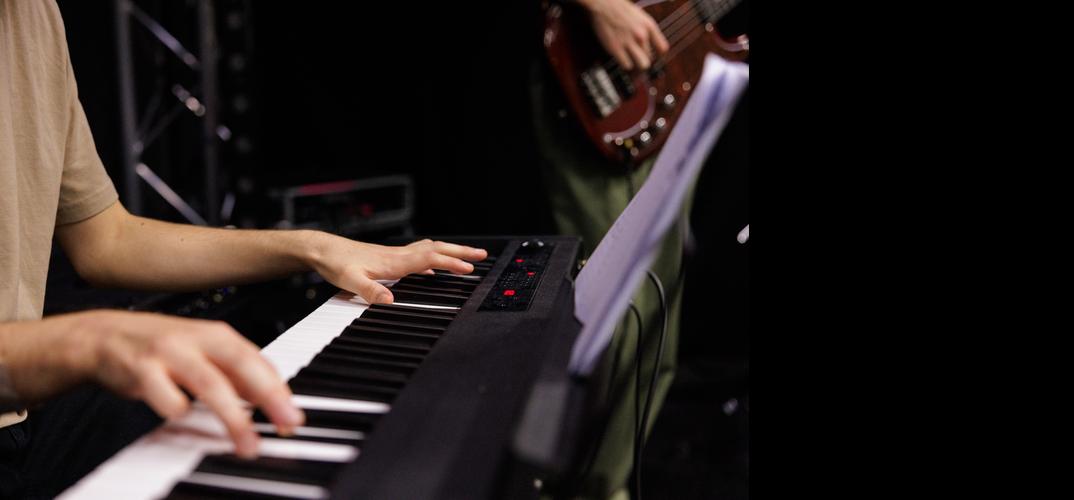University of Hertfordshire cements its world-class dementia expertise as it becomes major partner for UK’s second Centre of Excellence

Hertfordshire has been designated as the UK’s second National Centre of Excellence for Music and Dementia Training by the National Academy for Social Prescribing (NASP). The University of Hertfordshire is set to play a major role in the regional partnership that will deliver the training.
The primary goal of the two-year Music and Dementia Training programme is to establish champions within Hertfordshire’s care homes that can embed the use of therapeutic music techniques within dementia care to improve the quality of life of individuals living with dementia.
Outcomes for the residents include improved communication, wellbeing, reducing anxiety and depression, improving self-esteem, cognitive stimulation, encouraging reminiscence, expressing feelings and connecting to cultural identity.
It draws on existing evidence that music can have a positive influence on those who are living with dementia.
Hertfordshire County Council led the county bid for funding from the Power of Music Fund of the NASP and has now integrated it into its dementia strategy for 2033-2028 using its extensive network. Age UK Hertfordshire - who have extensive experience in partnership projects and service delivery for PLWD – will then lead on delivery.
It is expected that the collaborative effort within Hertfordshire could influence the UK’s national approach.
Working with the project’s partners, the University’s team will help create an evaluation and measurement framework for the programme designed to build confidence in care home staff to champion the use of music, access a support network, and to include cultural diversity and sensory needs such as sight loss. A robust evaluation programme will allow the programme to be replicated and scaled up. The programme begins in June.
The work at the University will be led by the Centre for Research in Public Health and Community Care (CRIPACC) at its School of Health, Medicine, and Life Sciences. Professor Alejandro Quiroz Flores, Director of CRIPACC, said:
“This is a truly multi-party approach to exploring the benefits of music as a positive means to help people across the spectrum of their dementia progression, including its prevention, as well as intervention and prescription. We will be at the centre providing our knowledge and expertise.”
Professor Flores said the University’s role draws on CRIPACC’s world-class research in ageing, dementia, and care homes. This includes the four-year DACHA study led by Herts’ Professor of Health Care Research, Claire Goodman, which developed research resources and minimum data sets for care homes’ use.
The university’s participation also draws on Dr Helen Abnett's expertise in improving quality of public service delivery, particularly health and social care service provision, and exploring the role of voluntary sector organisations in cross-sector partnerships.
Dr Abnett said: “This approach, bringing together organisations from across the public, private, academic, and voluntary sectors, demonstrates the potential of collaborative, place-based partnerships for improving the quality of services.”
Professor Flores said the University’s role not only draws on its extensive public health research and decades-long involvement with patients and the public, but also crucially on the expertise and synergies with the School of Creative Arts and the Business School.
In Hertfordshire Business School, Professor Stephen Page has worked for several years helping organisations in the travel industry to design dementia-friendly services and tourism. He is also a member of the Prime Minister's Dementia Challenge Working Group on Air Transport.
“This holistic understanding means we can play a very important role in helping to design training for care homes and help to evaluate its impact,” Prof Flores added.
The partnership aims to deliver the training and embed change in practice to 100 providers within the funded period which will reach approximately 6000 staff across the care homes. This in turn will benefit approximately 5,800 people living with dementia (PLWD).
Sarah Perman, director of public health at Hertfordshire County Council, said: "Through this project, Hertfordshire is set to lead the way in embedding music into dementia care on a large scale, influencing both local and national approaches.
"The Centre of Excellence will not only support care homes but also eventually extend training opportunities to community groups, mental health services, and hospices, ensuring that more people can benefit from the life-changing power of music."
The Hertfordshire Care Providers Association (HCPA) are the leading training organisation in the area for care and have 760 providers registered with them as members. This membership network is comprised of CQC regulated Nursing and residential care homes, domiciliary home care providers and voluntary sector organisations who regularly engage with HCPA and utilise their training offer as well as information, advice and guidance.
Music24, a community music charity across Bedfordshire and Hertfordshire, will use its extensive experience in delivering the benefits of music to PLWD in the community and in care settings, and also in upskilling and training other providers. Music24 and HCPA will develop and coproduce a robust and comprehensive training package, in partnership with other providers including Herts Musical Memories, Music for my Mind, and the Hertfordshire Music Service, which will be rolled out via the existing HCPA member network over the funded period to maximise the reach.
The first Centre of Excellence for Music and Dementia was established in Manchester in 2024. It supports community-based music cafes across Manchester, measuring their impact and their potential to improve lives and reduce pressure on the NHS.
The Power of Music Fund was established by the National Academy for Social Prescribing, and this second Centre has been made possible thanks to support from the Rayne Foundation and the Utley Foundation.